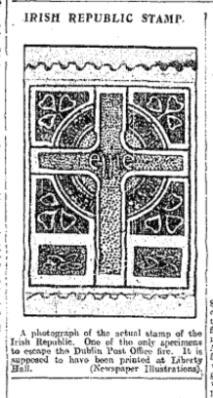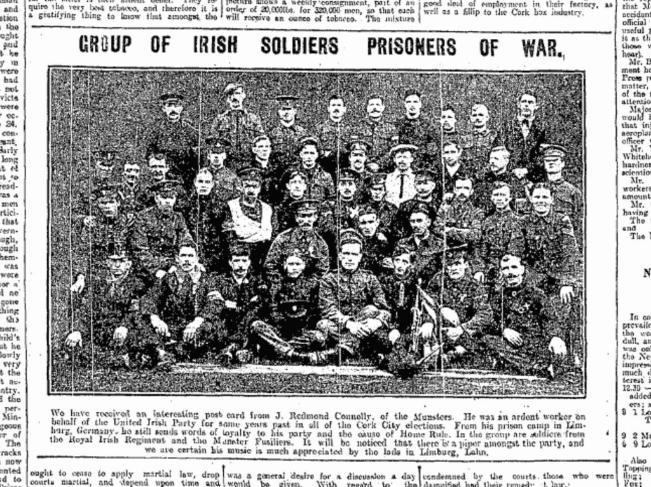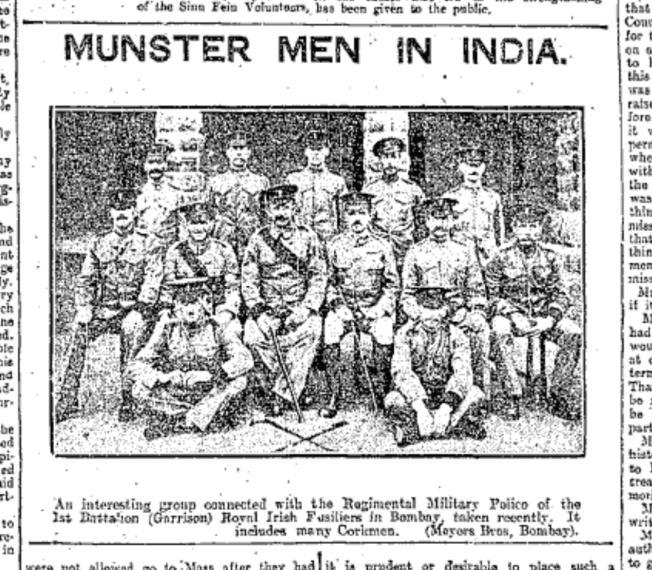In This Section
- Home
- Collections
- Atlas Resources for Schools
- Cork Fatality Register
- Mapping the Irish Revolution
- Mapping IRA Companies, July 1921-July 1922
- Mapping the Burning of Cork, 11-12 December 1920
- Martial Law, December 1920
- The IRA at War
- The Railway Workers’ Munitions Strike of 1920
- The Victory of Sinn Féin: The 1920 Local Elections
- The War of Words: Propaganda and Moral Force
- The IRA Offensive against the RIC, 1920
- De Valera’s American Tour, 1919-1920
- The British Reprisal Strategy and its Impact
- Cumann na mBan and the War of Independence
- The War Escalates, November 1920
- The War of Independence in Cork and Kerry
- The Story of 1916
- A 1916 Diary
- January 9-15 1916
- January 10-16, 1916
- January 17-23, 1916
- January 24-30, 1916
- February 1-6 1916
- February 7-14, 1916
- February 15-21, 1916
- February 22-27, 1916
- February 28-March 3, 1916
- March 6-13,1916
- March 14-20, 1916
- March 21-27 1916
- April 3-9, 1916
- April 10-16, 1916
- April 17-21,1916
- May 22-28 1916
- May 29-June 4 1916
- June 12-18 1916
- June 19-25 1916
- June 26-July 2 1916
- July 3-9 1916
- July 11-16 1916
- July 17-22 1916
- July 24-30 1916
- July 31- August 7,1916
- August 7-13 1916
- August 15-21 1916
- August 22-29 1916
- August 29-September 5 1916
- September 5-11, 1916
- September 12-18, 1916
- September 19-25, 1916
- September 26-October 2, 1916
- October 3-9, 1916
- October 10-16, 1916
- October 17-23, 1916
- October 24-31, 1916
- November 1-16, 1916
- November 7-13, 1916
- November 14-20, 1916
- November 21-27-1916
- November 28-December 4, 1916
- December 5-11, 1916
- December 12-19, 1916
- December 19-25, 1916
- December 26-January 3, 1916
- Cork's Historic Newspapers
- Feature Articles
- News and Events
- UCC's Civil War Centenary Programme
- Irish Civil War National Conference 15-18 June 2022
- Irish Civil War Fatalities Project
- Research Findings
- Explore the Fatalities Map
- Civil War Fatalities in Dublin
- Civil War Fatalities in Limerick
- Civil War Fatalities in Kerry
- Civil War Fatalities in Clare
- Civil War Fatalities in Cork
- Civil War Fatalities in the Northern Ireland
- Civil War Fatalities in Sligo
- Civil War Fatalities in Donegal
- Civil War Fatalities in Wexford
- Civil War Fatalities in Mayo
- Civil War Fatalities in Tipperary
- Military Archives National Army Fatalities Roll, 1922 – 1923
- Fatalities Index
- About the Project (home)
- The Irish Revolution (Main site)
Each week, we look back at what was “in the news” the same week 100 years ago – as reported in the Cork Examiner in 1916.
By Nicola Stathers
Monday, May 29, 1916
A photograph of the actual stamp of the Irish Republic. One of the only specimens to escape the Dublin Post Office fire. It is supposed to have been printed at Liberty Hall.

- Martial Law – Extension Proclaimed
Dublin, Saturday
The following is published today:
By the Lords Justices General and General Governors of Ireland.
A PROCLAMATION
Whereas disaffection and unrest still prevail in certain parts of Ireland, causing anxiety and alarm amongst the peaceful and law abiding subjects of His Majesty.
Now We, the Lords Justices General and General GOvernors of Ireland do hereby proclam that a state of Martial Law shall continue to exist throughout Ireland until further other.
Given at His Majesty’s Castle of Dublin, this 28th day of May, 1916.
Richard H. Cherry LCJ; J.O. Wylie.
God Save the King
- How MacBride Died
Of the rebel leaders who were executed (says “Wayfarer” in “The Nation”) MacBride’s bearing was the most soldierly. The officer in charge of the firing party showed (I am told) some emotion. MacBride said, gently, “Do not let what you have to do ever disturb your rest.” And when it was proposed to blind his eyes he refused, and said, “I’ve been looking down rifle-barrels all my life. Fire when I bow my head.”
Tuesday, May 30, 1916
- Rebellion Inquiry
The Royal Commissioners re-assembled today in Dublin. The first witness called at the opening of the sitting was Sir John Ross, of Bladensburg, former CHeif Commissioner of the Dublin Metropolitan POlice. He said he believed the landing of arms at Howth on 27 july 1914 was an event intimately connected with the Dublin rebellion; but in the statement he now read referred to a few matters that occurred before that day. The Government allowed the Arms Act to lapse in 1906, and thereby everyone in Ireland was enabled to arm. THis appeared to him to be an extraordinary step for any Government to take.
Wednesday, May 31, 1916
- Released Prisoners
In the House of Commons this evening Mr. Tennant informed Mr. Lough that up to the present 352 out of a total of about 2,000 persons who were arrested in connection with the Irish rebellion had been released.
- Irish Emigration Statistics
A White paper issued tonight giving Irish emigration statistics shows the number of emigrants who left Ireland during the year 1915 was the lowest recorded since the collection of emigrations returns which began in 1851. The total number of emigrants during last year was 10,792.
Thursday, June 1, 1916
- Adjournment of Parliament
Both Houses of Parliament will adjourn Thursday, today until June 20th for Whitsuntide Recess.
- Transferred to Dartmoor Prison
A party of twelve of the rebel leaders, sentenced by court-martial to long terms of penal servitude, were last evening removed from Dublin en route to Dartmoor Convict Prison.
Amongst them was Mr John McNeill whose sentence for life was announced yesterday. The party were brought down to the shipping wharf in the police van, and took their departure in the 7:30 steamer cargo service. Some wore ordinary dress, and others were attired in the Volunteer Uniforms. During transfer to the steamer public business about the wharf was cut off. A military escort of twenty accompanied the prisoners on the journey.
Friday, June 2, 1916
- Reports from the Front

We have received an interesting postcard from J. Redmond Connolly, of the Munsters. He was an ardent worker on behalf of the United Irish Party for some years past in all of the Cork City elections. From his prison camp in Limberg, Germany, he still sends words of loyalty to his party and the Cause of Home Rule. In the group are soldiers from the Royal Irish Regiment and the Munster Fusiliers.

It will be noticed that there is a piper amongst the party, and we are certain his music is much appreciated by the lads in Limburg.
